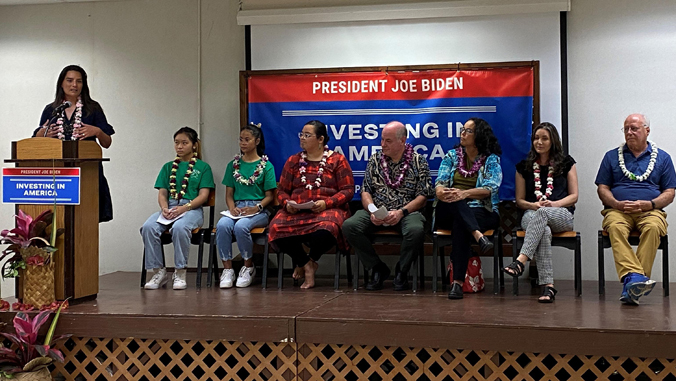
To reduce waste from disposable cups, bottles and food containers in Hilo, more than $2 million was awarded to the University of Hawaiʻi Sea Grant College Program (Hawaiʻi Sea Grant) and Hawaiʻi County Department of Environmental Management through two complementary grants from the U.S. Environmental Protection Agency (EPA).
Research shows that switching half of Hilo’s disposable foodware to reusables would lead to a reduction of 500 tons of solid waste annually and more than 3,000 tons of greenhouse gas emissions.
Hawaiʻi Sea Grant is partnering with two nonprofit organizations, Perpetual and Zero Waste Hawaiʻi Island (ZWHI), to support the design and implementation of a reusable foodware and refillable bottle system in Hilo with more than $600,000 in funding from the EPA Pollution Prevention (P2): Environmental Justice through Safer and More Sustainable Products Program.

Darren T. Lerner, director of Hawaiʻi Sea Grant, said, “We are thankful to have EPA support our partnership with Zero Waste Hawaiʻi Island and Perpetual to address plastic pollution at the source, and excited to bolster the health and resilience of our coastal communities by providing safe, affordable and reusable foodware options to our local schools and businesses in Hawaiʻi.”
These two complementary grants will fund reuse system infrastructure and equipment, and provide technical assistance to local businesses, schools and community organizations to enable a smooth transition to the reuse system. One goal of this large-scale approach is to enable a similar level of convenience as single-use disposable items.
Alternative to single-use plastics
The project offers a unique opportunity to implement a city-scale reuse system including sufficient dishwashing capacity, a city-wide network of public collection bins, efficient logistics to support the circulation of reusable items, and outreach to participating businesses and customers. It will also improve human health and the environment in disadvantaged communities by decreasing plastic waste and reducing human exposure to chemicals of concern in Hilo, focusing on serving intergenerational families, the unhoused and Native Hawaiians.
“We greatly appreciate EPA’s support, which will fund critical reuse infrastructure that will offer an alternative to single-use disposables and help address the plastic pollution crisis,” said ZWHI program director Jennifer Navarra. “This initiative is enabling communities to forge a more sustainable economy—one in which we work to repair food and family systems, respect ancestral practices, promote Indigenous education, and strengthen our relationship to the land—while empowering each person to take responsibility for their own waste.”
The funding was awarded to the Hawaiʻi County Department of Environmental Management through the EPA’s Solid Waste Infrastructure for Recycling grant program, and to Hawaiʻi Sea Grant through the EPA’s Pollution Prevention (P2): Environmental Justice through Safer and More Sustainable Products program, both authorized by the 2021 Infrastructure Investment and Jobs Act. The principal investigator is Elizabeth A. Lenz and the co-principal investigator is Eileen Nalley from Hawaiʻi Sea Grant.
The Hilo community is invited to participate in the design process through a series of public workshops the week of October 23, 2023. More information is available here.
For more information, see Hawaiʻi Sea Grant’s website.
–By Cindy Knapman

